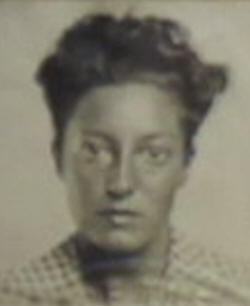

 Ruth
"Peter" Worth originally Ruth Wertheimer (April 10, 1915 - February 7, 1997) was a Jewish lesbian survivor of the Holocaust,American immigrant.
The life of this person has been researched by Esther Newton for her essay:
"Cherry Grove, Fire Island", published by Duke University Press.
Ruth
"Peter" Worth originally Ruth Wertheimer (April 10, 1915 - February 7, 1997) was a Jewish lesbian survivor of the Holocaust,American immigrant.
The life of this person has been researched by Esther Newton for her essay:
"Cherry Grove, Fire Island", published by Duke University Press.
Ruth was born into a well-to-do family in Halberstadt, Germany on April 10, 1915. While she was still a child her family moved to Berlin, where she was raised. Her mother's family owned a corset manufacturing and repair company with approximately five stores that served an upscale clientele. After Ruth's father, Leopold Wertheimer, died in 1918, her mother, Elli (also called Elly and Ellen) Bendix married Israel Rosenfeld, a film producer. At some point, Ruth shortened and Anglicized her birth-father's last name to Worth.
As a young woman, Ruth, aware that her sexual attraction was for women, started adding Peter to her name, and sometimes used Peter as her first name.
Starting in the late-1920s, Ruth and other family members suffered anti-semitism. In the spring of 1932, Ruth attended the Rackow Handelsschule in Berlin where the anti-semitism of her teachers and classmates forced her to leave before completing her two-year program. She was disappointed as she had hoped to gain a senior-level position in industry or commerce after graduating. In 1935, Ruth attended a new trade school in Berlin, the Fuerstin–Bismarck School, where she became friends with Edith Margot Alexander (later Certe).
On November 16, 1938, Worth left Germany for Paris, France. Her German passport, of that date, is stamped "J" for Jew. She possibly left Germany as a result of Kristallnacht (the Nazi-organized Crystal Night attack on Jews and Jewish businesses, that had occurred on November 9 and 10, 1938).
According to the recollection of anthropologist Esther Newton, who interviewed Worth, "after Peter and her mother went to Paris they were interned, along with many other German refugees, most or all of whom were Jewish, in a concentration camp called Gurs. Ironically, during this period, before the German invasion of France, these people were considered 'aliens'. Newton suggests that this incarceration was perhaps just an excuse to punish the German Jews. According to what Peter told Jonathan Ned Katz, she developed a flirtation (or perhaps more) with one of the female guards or administrators who then helped them to get out."
Worth's papers in the Baeck Institute contain a document headed: "Avis De Libération Du Camp D'internement De Gurs, 21 June 1940", providing evidence of her incarceration.
Worth found clerical employment at City College in New York City between 1943 and 1949, and from 1949 to 1958 she worked at Hunter College, where, Esther Newton recalls, Worth was an administrative secretary in one of the departments. Newton remembers: "She was a humble person and never expressed resentment to me about being overqualified for the job."
Around 1946, Worth bought a small house in Cherry Grove, Fire Island, New York, then a little-known community of lesbians and gay men. On August 29, 1986, Worth was one of the Cherry Grove inhabitants interviewed by anthropologist Esther Newton for her history of Cherry Grove, published in August 1993. Newton reports that Worth, "despite having somewhat left wing politics, was intensely patriotic, and whenever I would criticize some Reagan policy she would remind me that America gave her refuge and that there was no place else, she thought, where 'gay girls and boys' could be so free".
Worth was also was interviewed by Katherine Linton about her life's journey for "In the Life", the LGBT TV magazine produced in New York City, and that show first aired on October 27, 1996 when Worth was 81. A reviewer of that show said: "her spirit still lives in the irrepressible humor of her eyes, captured for posterity by the 'In the Life' video cameras."
Philis Raskind recalls that in 1991, when she became a summer renter in Cherry Grove, "I noticed this quiet, interesting looking older woman, Peter Worth, who walked around the community every morning with her little miniature poodle, Cherry. Even though I would say hello to her each day she never did more than nod at me. Deciding to make her acquaintance, I knew the way to her heart was through Cherry. I began to carry treats with me and would stop and pet the dog who immediately looked for me on their walks. Finally, Peter started talking to me!"
In 1996, Raskind purchased a home in Cherry Grove that she shared with her "closest friend", Jon Anderson, and his long-time lover, the painter Paul Cadmus. Raskind's home was close to Peter's home, and "We became close friends . . . ." Peter "told me her first sexual encounter with another woman was on her voyage to America."
Having applied for and received monetary compensation from the German government for property confiscated and income lost due to the Nazi regime, in her will Worth was able to leave a large donation to the Lambda Legal Defense & Education Fund, the national organization committed to achieving full recognition of the civil rights of lesbians, gay men, bisexuals, transgender people and those with HIV.
She also left a significant bequest to SAGE, the country's largest and oldest organization dedicated to improving the lives of lesbian, gay, bisexual and transgender (LGBT) older adults.
Worth made Esther Newton her literary executor, and Newton donated Worth's papers to the Baeck Institute, a Jewish history archive in New York City.
Worth left to her friend Amber Hollibaugh her Cherry Grove home.
My published books: